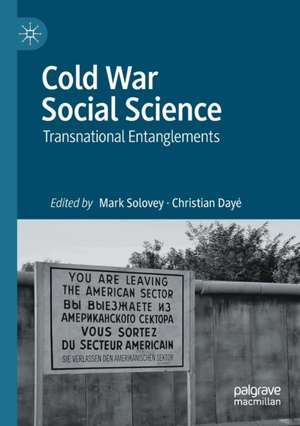Cold War Social Science: Transnational Entanglements
Editat de Mark Solovey, Christian Dayéen Limba Engleză Paperback – 14 mai 2022
| Toate formatele și edițiile | Preț | Express |
|---|---|---|
| Paperback (1) | 701.87 lei 6-8 săpt. | |
| Springer International Publishing – 14 mai 2022 | 701.87 lei 6-8 săpt. | |
| Hardback (1) | 953.76 lei 6-8 săpt. | |
| Springer International Publishing – 14 mai 2021 | 953.76 lei 6-8 săpt. |
Preț: 701.87 lei
Preț vechi: 825.73 lei
-15% Nou
Puncte Express: 1053
Preț estimativ în valută:
134.32€ • 145.85$ • 112.83£
134.32€ • 145.85$ • 112.83£
Carte tipărită la comandă
Livrare economică 23 aprilie-07 mai
Preluare comenzi: 021 569.72.76
Specificații
ISBN-13: 9783030702489
ISBN-10: 3030702480
Pagini: 400
Ilustrații: XXVI, 400 p. 9 illus.
Dimensiuni: 148 x 210 mm
Greutate: 0.56 kg
Ediția:1st ed. 2021
Editura: Springer International Publishing
Colecția Palgrave Macmillan
Locul publicării:Cham, Switzerland
ISBN-10: 3030702480
Pagini: 400
Ilustrații: XXVI, 400 p. 9 illus.
Dimensiuni: 148 x 210 mm
Greutate: 0.56 kg
Ediția:1st ed. 2021
Editura: Springer International Publishing
Colecția Palgrave Macmillan
Locul publicării:Cham, Switzerland
Cuprins
1. Introduction: Cold War Social Science, Transnational Entanglements.- Part I Exchanges Across the Iron Curtain.- 2. "Overtake and Surpass": Soviet Algorithmic Thinking as a Reinvention of Western Theories during the Cold War.- 3. Scientometrics with and without Computers: The Cold War Transnational Journeys of the Science Citation Index.- 4. Cold War Social Sciences beyond Academia? Radio Free Europe and the Transnational Circulation of Cold War Knowledge during the “CIA Years,” 1950–1971.- Part II Modernization Theory Meets Postcolonial Nation Building.- 5. Becoming an Area Expert During the Cold War: Americanism and Lustropicalismo in the Transnational Career of Anthropologist Charles Wagley, 1939–1971.- 6. The Anthropologist as Deviant Modernizer: Felipe Landa Jocano’s Journey Through the Cold War, the Social Sciences, Decolonization, and Nation Building in the Philippines.- 7. Latin America’s Dependency Theory: A Counter-Cold War SocialScience?.- Part III Creating Good Citizens.- 8. The Last Battlefield of the Cold War: From Reform-Oriented Leisure Studies to Sociological Research on the “Socialist Lifestyle” in Czechoslovakia, 1950s–1989.- 9. From Student-Centered Pedagogy to Student Labor: Chinese Education’s Transnational Entanglements during the Cold War.- Part IV Social Science Under Debate.- 10. Decentering Cold War Social Science: Alva Myrdal's Social Scientific Internationalism at UNESCO, 1950–1955.- 11. Transnational Constructions of Social Scientific Personae during the Cold War: The Case of Comparative Politics.- 12. Planned Economies, Free Markets and the Social Sciences: The Cold War Origins of the “Knowledge Society”.
Recenzii
“For Cold War Social Science: Transnational Entanglements has true merit. … this collection of disciplinary (self-)reflections should be required reading for social scientists themselves. For many of the aspects examined here—from data science, algorithmic thinking, and area studies, to the scientific objectivity posture and funding structures—are with us today. In short, this book deserves a wide readership.” (Clara Oberle, H-Soz-Kult, hsozkult.de, July 7, 2023)
“The book makes good on its claim that, by taking a transnational approach, the image of the social scientist asdominated by capitalist or socialist ideology yields to a far richer picture that emphasizes the diversity of intellectual agendas, traditions and values that defined social scientific research and researchers during the Cold War.” (John Krige, Annals of Science, Vol. 79 (3), 2022)
“The book's authors describe how imported knowledge was routinely reshaped for local purposes—and how, in some cases, traffic in ideas and practices went the other way, from the periphery to the center. The result is an important contribution to a field‐wide effort, one that has gained momentum over the last 15 years, to complicate (and pluralize) the idea of Cold War social science. … Cold War Social Science is an impressive, tightly edited collection, a model for tethering spread‐out case studies to a unifying theme.” (Jefferson Pooley, Journal of the History of the Behavioral Sciences, October 12, 2021)
“As is well-known, in the past thirty years or so, the history of the social sciences since 1945 has often concentrated on the Anglo-American world, relegating the transnational dimension of social science in the Cold War to footnotes. … Studying this collection of essays, readers will reach the conclusion that other, decentered, histories of the social sciences can be written that challenge the one-way conception of international social scientific exchange and favor instead multivocal narratives.” (Philippe Fontaine, Serendipities, Vol. 6 (2), 2021)
Notă biografică
Mark Solovey is Associate Professor in the Institute for the History and Philosophy of Science and Technology at the University of Toronto, Canada.
Christian Dayé is a sociologist at the Science, Technology and Society (STS) Unit of Graz University of Technology, Austria.
Textul de pe ultima copertă
This book explores how the social sciences became entangled with the global Cold War. While duly recognizing the realities of nation states, national power, and national aspirations, the studies gathered here open up new lines of transnational investigation. Considering developments in a wide array of fields – anthropology, development studies, economics, education, political science, psychology, science studies, and sociology – that involved the movement of people, projects, funding, and ideas across diverse national contexts, this volume pushes scholars to rethink certain fundamental points about how we should understand – and thus how we should study – Cold War social science itself. Mark Solovey is Associate Professor in the Institute for the History and Philosophy of Science and Technology at the University of Toronto, Canada.
Christian Dayé is a sociologist at the Science, Technology and Society (STS) Unit of Graz University of Technology, Austria.
Caracteristici
Considers the impact of the Cold War's transnational dimensions on social science Gathers contributions exploring a wide range of fields, from anthropology to political science Broadens our understanding of Cold War social science beyond nation-centered approaches
